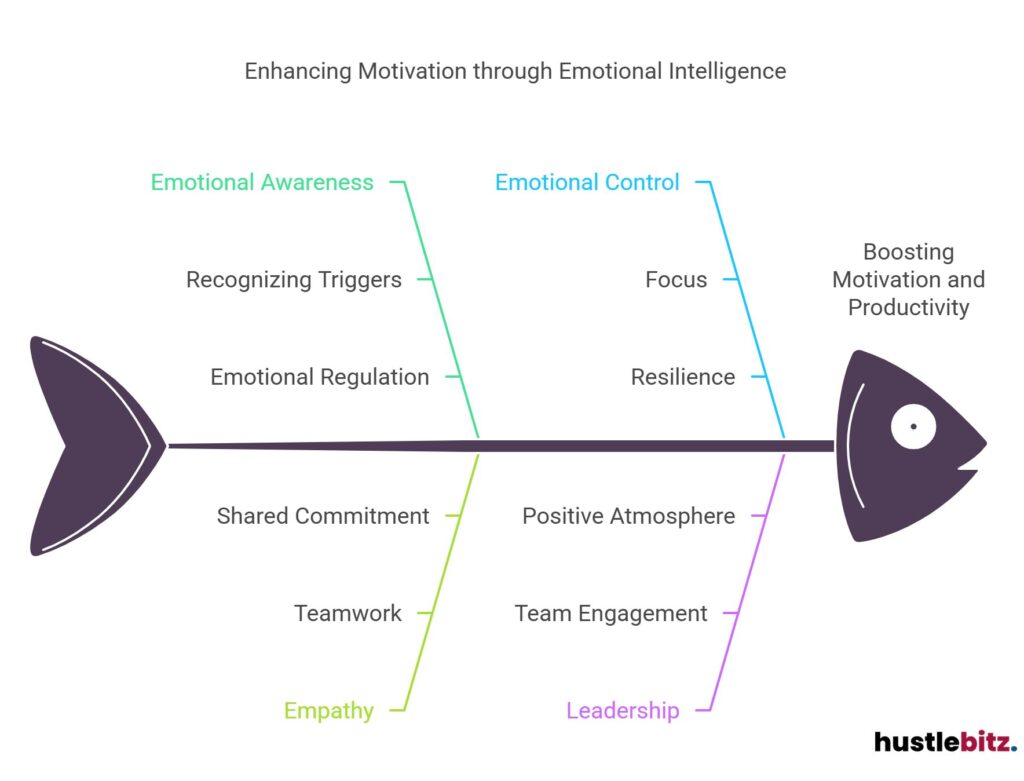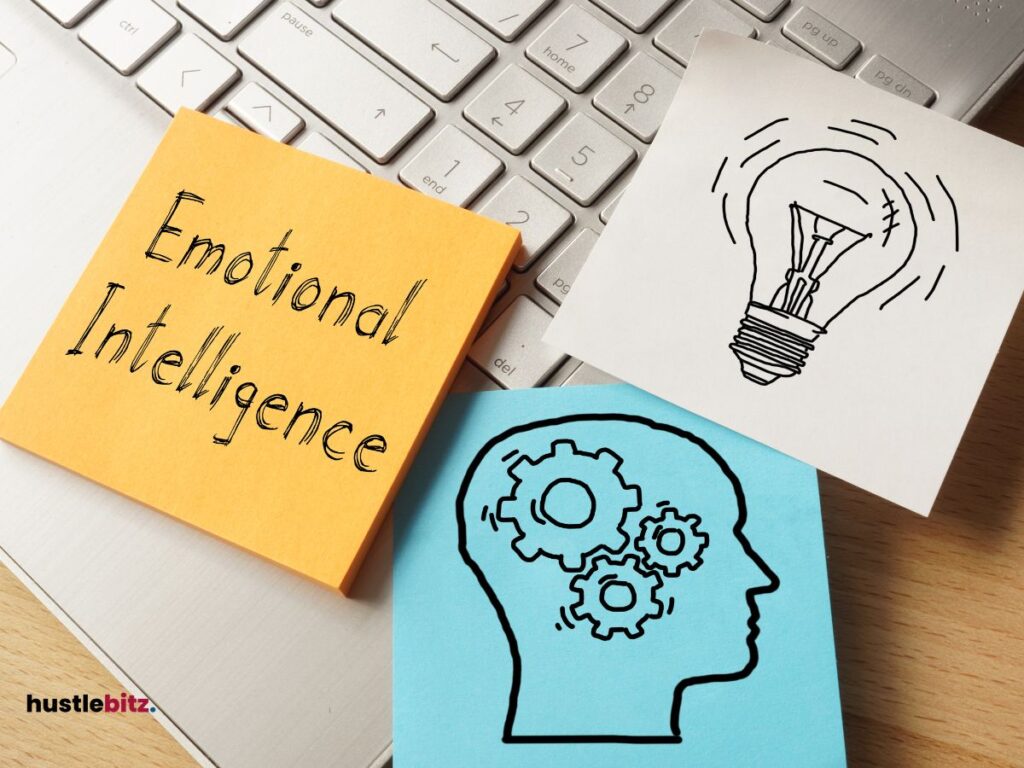Emotional intelligence (EI) plays a critical role in linking our emotions to our drive. By understanding and managing emotions, individuals can enhance both motivation and resilience, leading to a stronger commitment to goals. High emotional intelligence encourages an empathetic approach, which helps create supportive environments that maintain collective motivation, especially during challenging times. This ability to regulate emotions allows setbacks to be transformed into renewed determination, improving interpersonal relationships and leadership effectiveness. In a professional setting, emotional intelligence enhances collaboration and decision-making, contributing to a positive organizational culture. Understanding these dynamics is crucial for both personal and professional development, offering deeper insights into the relationship between emotions and drive.
Key Takeaways
- Emotional intelligence boosts motivation by enabling individuals to understand and direct their emotional drives towards goal achievement.
- Greater emotional awareness leads to better recognition of emotional triggers, resulting in more effective emotional regulation and perseverance.
- Empathy within emotionally intelligent environments strengthens collective motivation, promoting teamwork and shared commitment to objectives.
- Controlling emotions helps turn setbacks into renewed determination, ensuring focus and resilience in the face of challenges.
- Leaders with high emotional intelligence inspire their teams, driving engagement and fostering a positive atmosphere that enhances overall productivity.

Defining Emotional Intelligence

Emotional intelligence is the capacity to recognize, understand, and manage one’s own emotions while also navigating the emotions of others effectively. It comprises several core components, including emotional awareness, emotional understanding, and the ability to manage your emotions. These components collectively enable individuals to respond thoughtfully to their emotional experiences, fostering healthier interpersonal relationships and enhancing decision-making processes. The importance of emotional intelligence is particularly evident in both professional and personal settings, where collaboration and communication are key. Individuals with strong emotional intelligence skills are proficient at recognizing the emotional cues of others, allowing them to respond empathetically and constructively—essential for effective teamwork and conflict resolution. Additionally, emotional intelligence involves self-regulation, which is the ability to control impulsive feelings and behaviors, leading to more composed and clear-headed decision-making. Those who develop their emotional intelligence often experience improved relationships and increased resilience when facing challenges.
The Science of Emotions
The science of emotions encompasses the complex interplay between biological, psychological, and social factors that influence how individuals experience and express their feelings.
Emotional intelligence is the ability to recognize, understand, and manage emotions effectively, both in oneself and in others. This multifaceted concept is crucial for fostering positive emotional experiences and enhancing interpersonal relationships.
Research in the science of emotions has shown that emotional triggers—specific stimuli that elicit emotional responses—can significantly impact decision-making and behavior. For instance, a leader with high emotional intelligence can adeptly manage emotions within their team, creating an environment that promotes collaboration and innovation. In such contexts, emotional intelligence contributes to better performance and job satisfaction, demonstrating its importance in leadership roles.
Moreover, emotional intelligence is the ability to navigate complex emotional landscapes, enabling individuals to respond to challenges with resilience and empathy. By developing emotional abilities, individuals can enhance their capacity to understand the emotional states of others, fostering trust and open communication. This skill is particularly valuable in professional settings, where understanding the emotional nuances can lead to more effective teamwork and conflict resolution.
Ultimately, the science of emotions reveals that the ability to manage emotions is not merely an individual trait but a vital component of successful leadership and organizational dynamics. Cultivating emotional intelligence empowers individuals to harness their emotional experiences positively, resulting in improved well-being and productivity.
Emotional Awareness and Recognition

Awareness of one’s own emotions and the ability to recognize them in others are foundational components of emotional intelligence that significantly influence interpersonal dynamics.
Emotional awareness entails understanding and managing your emotions, enabling individuals to respond appropriately to various situations. This capability allows one to interpret emotional cues from others effectively, leading to more meaningful interactions and fostering stronger connections.
High emotional intelligence is characterized by the ability to identify emotions in oneself and others, which enhances empathy and improves communication. When individuals can accurately recognize their emotional responses, they can articulate their feelings through emotional expression, creating a more open environment for dialogue. This is particularly important in the workplace, where emotional intelligence can drive collaboration, reduce conflict, and enhance team performance.
Developing your emotional intelligence involves practice and self-reflection. By honing emotional awareness, individuals can better navigate social situations, leading to improved relationships. For instance, being attuned to the emotional cues of colleagues can help one respond more sensitively, fostering a supportive work culture.
Moreover, understanding emotions not only facilitates personal growth but also equips individuals with the tools to connect with others on a deeper level. As one enhances their emotional awareness, they cultivate the ability to engage with diverse perspectives, ultimately leading to more productive and harmonious interactions.
Thus, emotional awareness and recognition stand as pillars of emotional intelligence, essential for thriving in both personal and professional spheres.
Motivation and Emotional Drive

Harnessing motivation and emotional drive is crucial for achieving personal and professional goals, as they fuel perseverance and commitment in the face of challenges. Emotional intelligence serves as a cornerstone in this process, enhancing our ability to understand and manage our emotions, which in turn influences our motivation levels. Individuals with higher emotional intelligence possess greater emotional knowledge, enabling them to identify and harness their emotional drives effectively.
Empathy plays a pivotal role in motivating both oneself and others. By understanding the emotional states of those around us, we can foster a supportive environment that encourages collective motivation. This sense of connection not only enhances our drive but also amplifies the efforts of our peers, creating a positive feedback loop of encouragement and productivity.
Furthermore, the control of your emotions is essential for maintaining motivation. When faced with setbacks, individuals with strong emotional intelligence can navigate their feelings, transforming potential discouragement into renewed determination. This ability to manage negative emotions allows for sustained focus on goals and aspirations.
The benefits of emotional intelligence extend beyond self-regulation; they also include improved interpersonal relationships and leadership capabilities. By cultivating emotional drive through emotional intelligence, individuals can inspire and motivate teams, fostering an atmosphere where shared goals are pursued with vigor.
Ultimately, the synergy between motivation and emotional drive, powered by emotional intelligence, can lead to exceptional achievements both personally and professionally.
Building Resilience Through Emotional Intelligence

Resilience can be significantly enhanced through the application of emotional intelligence, as it equips individuals with the skills necessary to manage stress and navigate adversity effectively.
Emotional intelligence involves recognizing and understanding our own emotions and those of others, which is crucial in maintaining a stable emotional state during challenging times. By developing emotional intelligence competencies, individuals can better address their emotional needs and respond to setbacks with a constructive mindset.
In practice, individuals with high emotional intelligence can manage their own emotions more adeptly, allowing them to remain calm and focused under pressure. This self-awareness fosters resilience, enabling them to bounce back from difficulties rather than succumb to negative feelings.
Furthermore, strong interpersonal skills, a core component of emotional intelligence, facilitate supportive relationships that are vital during times of stress. These connections provide an essential support network, reinforcing an individual’s ability to cope with challenges.
Engaging in emotional intelligence training can further bolster resilience by teaching strategies to process and express emotions effectively. As individuals enhance their emotional intelligence, they become more adept at recognizing potential stressors and implementing proactive measures to mitigate them.
Ultimately, by prioritizing the development of emotional intelligence, individuals can cultivate resilience, ensuring they are better prepared to face life’s obstacles and uncertainties with confidence and poise.
Strategies to Improve Emotional Intelligence
Developing emotional intelligence involves a variety of targeted strategies that can enhance self-awareness, empathy, and interpersonal skills. Emotional intelligence is important not only for personal growth but also for fostering positive relationships in both personal and professional contexts.
One effective strategy to improve EI is through self-reflection. By regularly assessing one’s own emotional responses and triggers, individuals can gain a deeper understanding of their feelings and behaviors, which is essential for developing emotional resilience.
Another key approach is active listening. This involves fully engaging with others, paying attention to their verbal and non-verbal cues, and responding thoughtfully. By practicing these skills, individuals can enhance their ability to manage the emotions of others, creating a supportive environment that fosters connection and collaboration.
Furthermore, seeking feedback from trusted colleagues or friends can provide insights into how one is perceived emotionally, paving the way for growth. Participating in workshops or training programs focused on emotional intelligence also plays a crucial role in developing emotional competencies.
Ultimately, a high level of emotional intelligence enables individuals to navigate complex social environments, making it an essential component of effective leadership skills. By understanding that emotional intelligence is a skill that can be developed, individuals can harness the power of emotional intelligence to improve their interactions and achieve greater success in various aspects of life.
Emotional Intelligence and Workplace Performance

Emotional intelligence significantly influences workplace performance by enhancing collaboration, communication, and overall employee engagement. The role of emotional intelligence is increasingly recognized as a critical factor in achieving success within organizations. Employees with a high emotional quotient can navigate complex interpersonal dynamics, effectively manage their own emotions, and respond constructively to the emotions of others. This ability to manage emotions fosters a healthier work environment and improves team cohesion.
Emotional intelligence is an important asset for leaders, as it allows them to inspire and motivate their teams while effectively addressing negative emotions that may arise. In a leadership role, understanding the emotions of oneself and team members can lead to better decision-making and conflict resolution. Leaders who demonstrate high emotional intelligence create a culture of trust and open communication, where employees feel valued and understood.
To further enhance workplace performance, individuals can take steps to improve their emotional intelligence. This may involve self-reflection, seeking feedback, and developing skills such as empathy and active listening. By honing the ability to manage emotions, employees can not only enhance their performance but also contribute to a more positive organizational culture.
Final Thoughts
Emotional intelligence is a powerful tool that connects our emotions with our drive, playing a crucial role in both personal and professional success. By understanding and managing our emotions, we can enhance motivation, resilience, and our ability to achieve goals. High emotional intelligence fosters empathy, improves interpersonal relationships, and strengthens leadership effectiveness, contributing to a positive organizational culture. The strategies discussed, such as self-reflection, active listening, and emotional regulation, are essential for developing and enhancing emotional intelligence. By prioritizing these skills, individuals can not only improve their personal and professional interactions but also build a foundation for long-term success and well-being. Embracing emotional intelligence as a core aspect of our lives can lead to more fulfilling relationships, effective leadership, and a resilient approach to life’s challenges.




